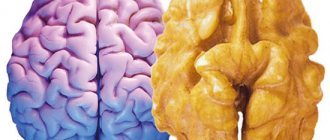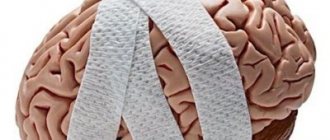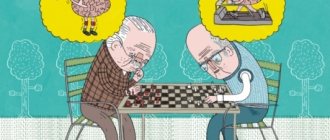Absolutely everyone knows that human memory, no matter how wonderful it is, deteriorates over time. And absolutely everyone also knows that this happens for various reasons, most often physiological. However, not every person is ready to put up with this state of affairs. This article is a kind of review of the most effective, from the point of view of leading nutritionists and physiologists on the planet, ways to improve memory.
What is memory
Omitting complex terminology and speaking in simple, understandable language, memory is a special ability of a person that allows him to remember, store and reproduce this or that information at the right time. A huge number of scientists have been and are studying all these processes.
Moreover, some of them even tried to measure the size of a person’s memory, for example, Robert Berge from Syracuse University (USA). He spent a long time studying the mechanisms of storage and transmission of genetic information and in 1996 concluded that the brain may contain from 1 to 10 terabytes of data . These calculations are based on knowledge of the number of neurons and the assumption that each of them contains 1 bit of information.
However, it is difficult to consider this information reliable at the moment, since this organ has not been fully studied. And the results obtained are more of a guess than a statement of fact. However, this statement provoked a large-scale discussion around this issue, both in the scientific community and online.
As a result, people thought not only about their own capabilities, but also about ways to improve them.
Nutrition and memory
Have you started to notice that your memory is gradually deteriorating? Well-known nutritionist Gu Chui Hong from Malaysia claims that in this case it is especially important to adjust your diet . After all, the reason for this may be a lack of nutrients necessary for the brain, which improve its blood supply.
She also mentions that there was a publication in the journal Neurology describing the positive effects of the Mediterranean and DASH diets (to prevent hypertension) on memory. According to them, you need to eat as much fish, fruits, vegetables and nuts as possible, trying to saturate your body with fiber.
“ You need to eat 7-9 servings of fruits and vegetables every day. Do not overuse salty foods and eliminate harmful fats, replacing them with healthy ones. You can also add cereal, lots of nuts and seeds, which contain unsaturated fatty acids ,” says Gu.
In addition, we must not forget about antioxidants. And blueberries are their best source. According to the nutritionist, scientists have long proven that 1 cup of blueberries a day can not only prevent memory impairment, but also improve brain activity. And all because it contains anthocyons. In addition to blueberries, any berries are suitable, as well as vegetables and fruits of blue, burgundy, pink, dark blue and black - blackberries, red cabbage, cranberries, black currants, etc.
Moreover, you need to add green leafy vegetables to your diet - spinach, lettuce, all types of cabbage. They contain folic acid, a deficiency of which can cause memory impairment. This conclusion was made after scientific studies in which 518 people aged 65 years and older took part.
It is also necessary to ensure a sufficient supply of omega-3 fatty acids, as these are excellent antioxidants. Most of them are in fish and seeds.
How to remember all these principles?
According to the nutritionist, it’s enough just to put a plate with the most “colorful” food in front of you. Thus, you can enrich your diet with all the necessary substances, improve blood circulation, memory and brain activity.
Top 12 Memory Improvement Products
Blueberry. Powerful antioxidant. 1 cup of blueberries per day is enough.
Walnuts. To feel the positive effect, you need to eat 20 grams. nuts a day.
Apples. They contain a large amount of vitamins that directly affect brain function. You need to eat 1 apple every day.
Tuna. It contains both omega-3 fatty acids and iron. In addition to tuna, mackerel, salmon, cod and seafood are suitable.
Citrus. They contain not only antioxidants, but also iron, which is necessary for normal brain function.
Poultry and beef liver. These are excellent sources of iron.
Rosemary. It is indispensable for good memory. It can be added to various dishes or tea.
Sage tea. It improves memory and increases concentration.
Beans. It contains B vitamins. They have a positive effect on brain function and help fight depression, which is often one of the causes of memory impairment.
Eggs and, in particular, egg yolk. In addition to proteins and vitamins, it contains a special substance called choline, which also improves memory.
Milk and dairy products. Sources of choline and vitamin B12, the lack of which negatively affects brain function and memory.
Coffee. Research results have shown that this drink helps concentrate and also saturates the body with antioxidants. The main thing is not to abuse it and drink no more than 1-2 cups a day.
Lemon
A simple slice of lemon added to tea may be enough to improve memory. And it's all about vitamin C, which prevents forgetfulness and helps keep in mind everything that will be needed in the coming hours.
Lemonade
3 lemons
2 liters of cold boiled water
1 cup sugar (adjust the amount to taste)
3 mint leaves
Step 1. Wash the lemons and scald with boiling water. Cut into small pieces.
Step 2. Place chopped lemons in a blender bowl and add sugar, add mint and puree everything in a blender until pureed.
Step 3 . Pour water over the puree and adjust the amount of sugar. Place in the refrigerator overnight.
Step 4 . The next morning, strain and drink chilled.
How else can you improve your memory?
- Get enough sleep . Insomnia or lack of sleep, less than 6-8 hours can provoke memory impairment.
- Visit an endocrinologist regularly . Many people with thyroid disease have poor memory. By the way, the same symptoms can be observed in all those who suffer from chronic diseases, as well as diabetes.
- Avoid drinking alcohol, excessively salty foods and smoking , as well as foods containing unhealthy fats (butter, lard), replacing them with vegetable oils with healthy fats.
- Never stop learning . Any brain activity has a positive effect on memory.
- Communicate . Scientists say that sociable people have practically no memory problems.
- Develop new habits . They make the brain work, thereby improving memory. You can also solve crosswords, play mind games, or do puzzles.
- Exercise . Physical activity improves blood circulation and saturates the brain with oxygen, which undoubtedly has a positive effect on both its activity and memory.
And also look for the positive in everything. Dissatisfaction with life often leads to depression, which causes memory impairment.
Attention! The information is for informational purposes only and is not intended to make a diagnosis or prescribe treatment. Always consult a specialized doctor!
Tatyana Eliseeva chief editor of the Food+ project
Ask a Question
Rating:
10
/10
Votes: 8
Usefulness of material 10
Reliability of information 10
Formatting of Article 10
Symptoms of memory disorders
It is believed that only people of retirement age suffer from memory impairment. This is actually a very common problem. About 30% of young and 70% of older people experience it. It can be temporary and minor, or progressive and incurable.
Therefore, people of any age should pay attention to the following symptoms:
- Hypomnesia. A person loses the ability to remember new information: names, events, dates. Also, during a conversation, he forgets many expressions and increasingly uses the phrase “I forgot what it’s called.” Stops navigating in a familiar space, forgets a person’s face, and cannot remember a phone number.
- Amnesia (complete or partial loss of memory). A person cannot remember events that happened to him several months or years ago. Some patients do not remember what happened to them a couple of days or hours ago.
- Hypermnesia. The person began to remember several times more than he remembered before, even if he did not need the information. This happens unconsciously and uncontrollably. Often pictures, events, and cues from the past can appear on their own.
call me back
What does the brain need?
Proper nutrition is not only a set of foods rich in vitamins and macroelements. The basis of the diet is moderation and balance. We must avoid extremes: hunger and overeating. For normal blood supply, the body needs light and healthy food; fish, vegetables, lean meat, fruits, cereals, nuts. Next, we will tell you which substances will help improve brain function in adults and children.
Constant tension, stress, irregular nutrition, lack of sleep, poor environment - all these factors negatively affect brain cells. A complex of vitamins will help fill in the gaps and improve memory:
- B1 (thiamine) is the most important vitamin for those who work with a large amount of information. Element B1 helps the brain quickly switch from one topic to another and perform diverse tasks;
- B2 (or riboflavin) will help the body cope with emotional burnout and increased anxiety. B2 stabilizes the nervous system and improves memory. B3 (or niacin) promotes energy production, stimulates the restoration of nerve cells, and improves memory processes. Vitamin B3 is indispensable for athletes and people involved in physical labor;
- B5 (pantothenic acid) stimulates brain function, improves long-term memory, neutralizes depression;
- B12 (cyanocobalamin) supports the nervous system and improves concentration.
Vitamin complexes to improve memory can be found in any pharmacy. But taking medications will only be effective with proper nutrition. What products should be on your table? We'll talk about this in the next section.
Cocoa and chocolate
Cocoa beans contain magnesium, a trace element necessary for normal memory function. Therefore, freshly brewed hot cocoa for breakfast will provide the student with “long-lasting” energy for the whole day. Cocoa also helps to dilate blood vessels, improve blood circulation, stimulate brain activity and improve mood. If your child loves chocolate, then bitter chocolate, which contains more than 60% cocoa beans, will be beneficial for the student’s mind.
Salmon
Salmon contains large amounts of Omega-3 polyunsaturated fatty acids, which improve memory and attention. At an early age, Omega-3 will prevent ADHD. Just 120 grams of fish prevents the appearance and development of cancer. Omega-3 complexes from Biopharma will help you replenish your daily dose of polyunsaturated fatty acids.
Top 15 most useful products
Nutritionists and scientists have named several foods that have the greatest effect on the functioning of memory and the mind in general. It is recommended to include them at least in small quantities, but regularly in the diet.
Blueberry
The American research organization Life Extension Foundation several years ago studied the effect of berries on brain function.
In particular, blueberries improve the sensitivity of neurons to impulses . And this is most noticeable on the optic nerve. That is why blueberries are often recommended to those whose vision deteriorates. At the same time, it improves the speed of memorizing information, especially in old age.
Fatty fish
Fish oil contains one of the highest concentrations of omega-3 fatty acids suitable for absorption by neurons. Herring, trout, mackerel are the best options.
A simpler option is fish oil supplements. These cost mere pennies, but are extremely important for brain health and memory function.
Coffee
Caffeine acts on the brain as a neurostimulant. That is, it forces nerve cells to enter an active state , thereby improving memory. But the effect is short-lived.
Doctors also claim that too high a dose of caffeine can act as a shock absorber, that is, the effect will be the opposite.
What is the optimal “dose” of coffee per day for an adult to get the maximum memory benefit from it? No more than 2 - 3 cups of regular custard.
Nuts
They contain magnesium, thiamine, B vitamins, E, as well as omega-3 and omega-6 essential fatty acids.
For the most part, these components are necessary to protect nerve cells from aging and subsequent destruction . And the more often you eat nuts, the slower your brain will “age.”
The healthiest nuts for memory are considered to be ripe, undried walnuts and pistachios.
Nuts must be included in the diet of pregnant girls - this will help protect the still developing nervous system of the unborn child from various kinds of pathologies.
Dried fruits
The main “fuel” for the brain is simple and complex carbohydrates, which are subsequently processed into glucose and transformed into energy. It is from this that the body gets the opportunity to form neuroimpulses .
Dried fruits are one of the most beneficial carbohydrates for the human body.
And in addition to the fact that they are high in easily digestible fructose, they also contain insoluble fiber - it improves the functioning of the digestive system, which will allow you to get more micronutrients from food. Dried fruits also strengthen the heart.
bitter chocolate
Chocolate is good for the brain because cocoa powder contains flavonol, which is an antioxidant. In addition to “protecting” nerve cells from aging and destruction, this element takes part in the production of serotonin , and also increases the sensitivity of the brain to this hormone (which is often called the “happiness hormone” - it directly affects a person’s mood and emotions).
However, you should give preference to either hot chocolate or homemade one, because “store-bought” chocolate often contains vegetable trans fats, and it also has a fairly low content of cocoa powder.
Turmeric
Contains iodine, phosphorus, vitamins C and B, calcium, iron, and a wide range of alkaloids. All this together slows down the aging process of brain cells and accelerates their regeneration.
Turmeric also slightly enhances the absorption of nutrients from the blood and accelerates blood flow.
Read more about the effects of turmeric on the brain here.
The special color of turmeric is due to curcumin. This enzyme, as studies show, significantly increases the resistance of brain tissue to the development of tumors, and is even considered by some scientists as a cure for cancer. So, consuming this spice will also help reduce the risk of cancer.
Eggs
For the brain, the most beneficial of chicken and quail eggs is choline (aka vitamin B4), which enhances the neuroprotective effect, protects the cell membranes of neurons from destruction , and at the same time cleanses the blood vessels of the brain, since it reduces cholesterol levels, which often causes “ blockages" of blood vessels in the brain.
It is worth noting that choline can be synthesized in the human body from simpler microelements, but the diet of modern man is such that protein foods predominate in it. This is what causes choline deficiency. You can restore its balance by including eggs in your diet. Moreover, it is better to eat them fresh.
Fresh chicken eggs are dangerous because they can be a source of salmonellosis. But quail eggs are completely protected from this infection. It is better to consume them fresh.
Broccoli
Broccoli contains sulforaphane - this substance prevents the degradation of protein compounds in the brain. Simply put, this vegetable will help “squeeze” all the functionality out of already damaged cells of the nervous system.
They are especially useful for older people. Scientists have proven that including broccoli in the diet reduces the likelihood of sclerosis and dementia to almost zero.
Garlic
Garlic is one of the richest natural sources of rare essential oils and vitamin C. These elements help break down complex lipids accumulating in blood vessels, and at the same time protect the brain from toxins and infections.
Some essential oils contained in garlic have an irritating effect on the entire nervous system, thereby causing neurons to become active.
The effect can be compared to caffeine, but without any negative consequences for the cardiovascular system. On the contrary, garlic helps normalize blood pressure and blood flow speed in the small vessels of the brain. We talked more about the effect of garlic on the brain here.
Regular drinking water
Scientists from the University of East London have found that drinking about 2 liters of drinking water can improve brain function and memory by about 14% .
The comparison was made among residents of countries with a favorable economic climate and those living in regions suffering from a lack of drinking water.
What does all this have to do with it? With the fact that the brain needs zinc, calcium, iodine, magnesium, iron, but these elements are absorbed only with normal water-salt balance in the body . Otherwise, they are “save for a critical case” and are used to produce adrenaline.
If the balance of sodium and potassium is normal (and they inhibit each other, due to which balance is achieved), then the brain will evenly use zinc, calcium, iodine, magnesium and iron (mainly for the functions of the endocrine system). So even ordinary drinking water will help improve your memory.
Pumpkin seeds
Among vegetables and fruits, they have the highest zinc content, which not only strengthens memory, but also increases IQ.
Moreover, it is enough to consume only 15 - 20 grams of pumpkin seeds daily - this is enough to normalize the balance of zinc in the body (which is also necessary to improve the condition of the skin).
Tomatoes
Tomatoes contain a high concentration of lycopene - the same antioxidant that protects cells of the nervous system (including the spinal cord) from destruction.
This element in tomatoes is preserved even during heat treatment, so it is allowed to consume tomato juice or even just canned tomatoes.
Green leafy vegetables
This can include parsley, dill, and other various greens that are actively used in modern cooking.
Their main benefit is their high iron content, which helps speed up biochemical processes in nerve cells, and also normalize the composition of blood and lymph . Iron also helps transport oxygen through the blood.
Legumes
Beans or peas are one of the best sources of B vitamins.
They also help normalize the digestive tract and reduce intestinal congestion, which will increase the amount of micronutrients obtained from food.
Egg yolks
Yolks contain a lot of choline, which is important for the proper formation of the fetal brain in the womb. They make a person happier by provoking the production of happiness hormones. Many people are afraid to eat yolks so as not to provoke an increase in cholesterol. Recent studies have shown that eggs do not increase low-density lipoprotein levels in adults. In fact, they raise the concentration of good cholesterol. Organic foods are rich in protein.
How does nutrition affect brain function?
The quality of brain function and, in particular, such a criterion as concentration of attention depends on everything that a person eats and drinks throughout his life. The mechanism of this influence is as follows:
- All food entering the digestive tract undergoes breakdown. First, under the influence of gastric juice, then, in the small intestine, it decomposes into proteins, fats and carbohydrates, which, together with vitamins, minerals, organic acids and other beneficial substances, are absorbed through the intestinal walls and enter the blood.
- Next, useful substances are delivered through the circulatory system to organs, including the brain.
If the blood contains everything necessary for the full functioning of the brain, a person gets less tired, is in a good mood, and his memory and attention work without interruption.
If food is poor in the elements necessary for the brain, then both memory and the head as a whole do not work well. In addition, harmful substances clog blood vessels and make it difficult for blood, which contains oxygen and nutrition, to reach brain cells. As a result, the brain begins to perform cognitive functions even worse.
Harmful products
Having included healthy foods in the menu, you need to limit the consumption of junk food. Unfortunately, without changing your eating habits you will not get the desired effect. As we wrote above, brain cells need good blood supply. Therefore, it is worth excluding from the diet foods that contribute to the development of atherosclerosis:
- fatty meat, lard, smoked meats;
- cream, fats, margarines;
- fast food;
- baked goods, sweets;
- alcohol.
All of the above does not provide the body with useful substances, on the contrary: fried potatoes, smoked lard, milk fat, sugar and alcohol destroy it, contribute to the aging of blood vessels and the formation of atherosclerotic plaques. All this leads to early aging of the brain, decreased concentration, and the development of dementia.










